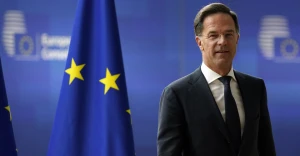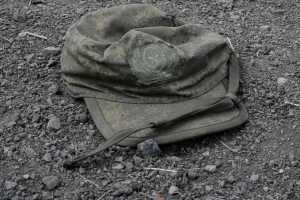
Does Russia's escalating threat looming over Europe signal war in already underway?
The hesitation to acknowledge the ongoing conflict with Russia — whether described as shadow or hybrid warfare — stems from years of neglecting security threats, many believe
Bloomberg explains.
Mark Rutte, NATO's new head, stated what many Europeans have avoided acknowledging: "It’s time to shift to a wartime mindset."
According to Bloomberg, whether it's shadow, hybrid warfare, or even terrorism, everything points to war with Vladimir Putin’s Russia. The reluctance to acknowledge it stems from decades of complacency on security, as governments prioritized energy deals and trade.
For years, experts along NATO's eastern frontier have warned of threats, and now military and intelligence agencies see a growing Kremlin campaign to destabilize Europe, including alleged sabotage in Germany, a planned assassination of a defense CEO, and covert election interference in Romania and Moldova.
“It’s difficult to acknowledge this, politically inconvenient to admit, economically costly to accept, but it’s the duty of any politician who cares about Europe to recognize this reality,” Gabrielius Landsbergis, Lithuania’s foreign minister said at a conference on December 10.
Putin’s invasion of Ukraine on Feb. 24, 2022, reshaped Europe’s security landscape, prompting the EU to support Ukraine while avoiding direct involvement in a broader conflict. However, the EU's lack of a unified foreign policy has been its vulnerability, with diplomats privately likening Russia's escalating attacks to the "boiled frog syndrome" - a dangerous situation recognized too late.
“We Europeans can’t look away, because if Russia succeeds in Ukraine it won’t stop there,” Czech Prime Minister Petr Fiala said in an interview, recalling boyhood memories of Soviet tanks sent by Moscow to crush the Prague Spring in Czechoslovakia in 1968. “We must ramp up arms production capacities and do more for our own security.”
Even if Putin’s invasion of Ukraine ends soon, Europe will still face a hostile Russia with a battle-hardened army and a war economy producing vast amounts of armaments. Some officials fear a direct military clash and worry that Europe will be vulnerable if U.S. security guarantees within NATO weaken under President Donald Trump.
Europe must invest heavily to compensate for potential gaps in defense. Over two-thirds of NATO members are on track to meet or exceed the alliance’s 2% GDP defense target. However, the EU is still figuring out how to ramp up arms manufacturing to meet the billions in needed euros. The challenge, according to one official, is that many in the bloc still believe the U.S. can be relied on, no matter who occupies the White House.
Putin has long signaled his intentions. He views the collapse of the Soviet Union as a tragedy and has sought to restore Russia's power. His determination to confront the West became clear as early as 2007, when he called NATO expansion a “serious provocation” at the Munich Security Conference.
Russia's aggression continued with the 2008 war in Georgia, followed by a decade of rearmament. Putin used these forces to annex Crimea in 2014 and intervene in Syria in 2015, strengthening his influence in the Mediterranean. Each move seemed to go unchallenged by the U.S. and its allies, reinforcing the perception of Putin as an infallible leader whose decisions were unquestionable.
Putin accused the U.S. of attempting to "inflict a strategic defeat" on Russia through its involvement in Ukraine. He claimed that the U.S. was using a fabricated Russian threat to scare its population into believing that Russia intends to attack other countries, speaking at a meeting with top defense officials.
Russian Defense Minister Andrey Belousov openly stated that Russia must enhance its military to ensure "full readiness for any development of the situation in the medium term," including the possibility of a military conflict with NATO in Europe within the next decade. He made these remarks during the same meeting.
The outlet emphasizes that the war in Ukraine has bought Europe time, as Putin's military misjudged the situation, expecting quick victory. This hubris led to heavy Russian casualties. With ally support, Ukraine has launched strikes inside Russia using U.S. and UK-supplied missiles. On Wednesday, Russia accused Kyiv of organizing the assassination of a top Russian general in Moscow.
The sudden collapse of Assad's regime this month further damaged Putin's image as a master strategist. He questioned why Russia's intelligence service failed to detect the growing threat to Assad's rule until it was too late.
Top officials have no alternative but to support Putin’s decisions, said Tatiana Stanovaya, founder of the consultancy R.Politik and a senior fellow at the Carnegie Russia Eurasia Center. “It’s just more comfortable, safer, and psychologically easier,” she said.
Indeed, it remains unclear how far Putin’s prepared to go. Former UK Defense Secretary Ben Wallace said he saw only a “low chance” that Putin would go to war with NATO because he knows he can’t compete militarily.
NATO has strengthened its presence in the Baltics, with Germany moving a brigade to Lithuania, and Finland and Sweden advising citizens to prepare for conflict. European leaders were slow to recognize the danger posed by Russia, raising concerns about how Europe would respond to an attack.
NATO foreign ministers discussed Russian hostile actions, with a senior European military official warning that Moscow could launch an assault on NATO territory in five to eight years, particularly threatening countries on the alliance's eastern flank.
There’s already a lengthening list of incidents. Romania's top court annulled the first round of its presidential election due to a Russian meddling campaign supporting a pro-Putin candidate. Moldova also accused Russia of bribing voters in a referendum on EU membership, though Moscow denied involvement.
European and U.S. intelligence warned last month that Russia may plant incendiary devices on planes via air cargo. In July, German authorities linked Russia to a fire at a DHL center. U.S. and German services also foiled a plot to assassinate Rheinmetall AG’s head. Poland closed Russia’s consulate in Poznan over sabotage and espionage. NATO is preparing new targets for increased arms production and may require members to spend 3% of GDP on defense.
Rutte, the former Dutch prime minister known for his straight talking, laid out his view in his first major speech as NATO secretary general since taking over the role in October. Europe may not be in a full-blown war yet, but it’s definitely not in peace. “We are not ready for what is coming our way in four to five years,” he said last week. “How many more wake-up calls do we need?”
- News













































